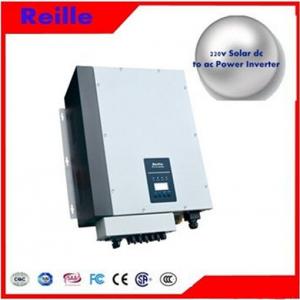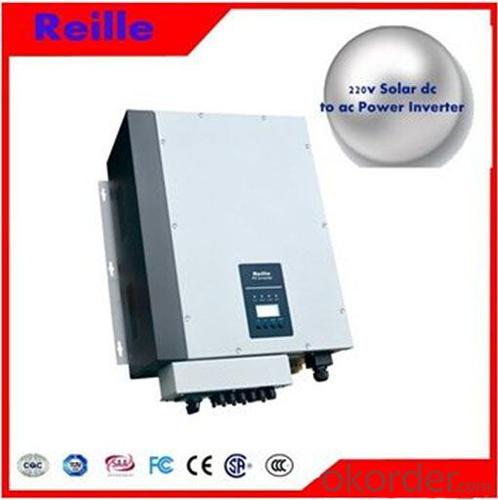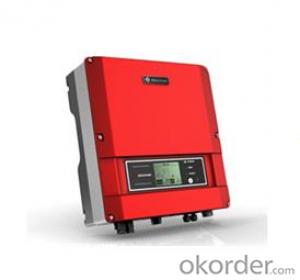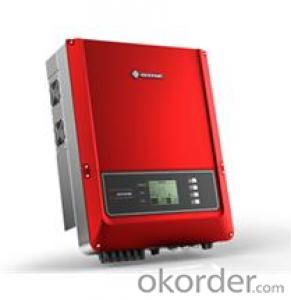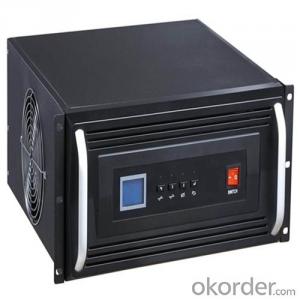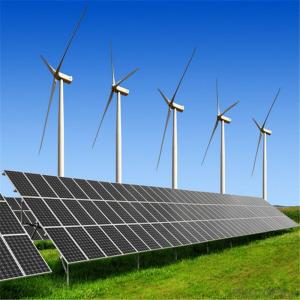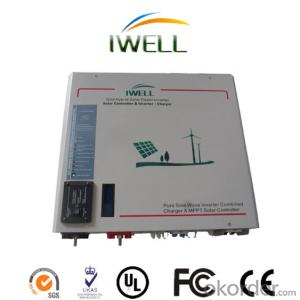Rv Solar Inverter Kit with Charger/Hybrid Solar Inverter/Single Phase Inverter (Pass CE, ISO Certificate)
- Loading Port:
- China main port
- Payment Terms:
- TT or LC
- Min Order Qty:
- 150000 watt
- Supply Capability:
- 3000000 watt/month
OKorder Service Pledge
OKorder Financial Service
You Might Also Like
1. Structure of Power Inverter with Charger/Hybrid Solar Inverter/Single Phase Inverter
(Pass CE,ISO certificate) Description
A solar inverter, or PV inverter, or Solar converter, converts the variable direct current (DC) output of a photovoltaic (PV) solar panel into a
utility frequency alternating current (AC) that can be fed into a commercial electrical grid or used by a local, off-grid electrical network. It is a
critical BOS–component in a photovoltaic system, allowing the use of ordinary AC-powered equipment. Solar inverters have special
functions adapted for use with photovoltaic arrays, including maximum power point tracking and anti-islanding protection.
2. Main Features of Power Inverter with Charger/Hybrid Solar Inverter/Single Phase
Inverter (Pass CE,ISO certificate)
• High MPPT accurac>99.9%
• Wide input voltage range
3. Power Inverter with Charger/Hybrid Solar Inverter/Single Phase Inverter (Pass
CE,ISO certificate) Images
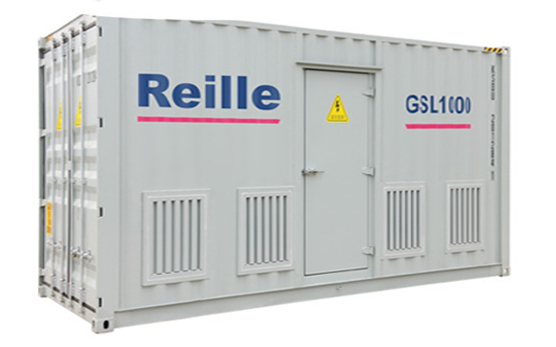
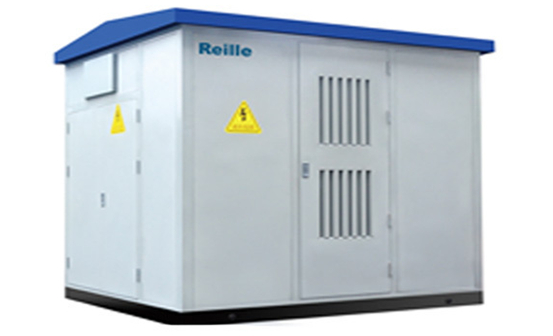
4. FAQ of Power Inverter with Charger/Hybrid Solar Inverter/Single Phase Inverter
(Pass CE,ISO certificate)
Q1:Can we visit your factory?
A1:Sure,welcome at any time,seeing is believing.
Q2:Which payment terms can you accept?
A2:T/T,L/C,Moneygram,Paypal are available for us.
- Q: What is the maximum number of MPPT inputs in a solar inverter?
- The maximum number of MPPT inputs in a solar inverter can vary depending on the specific model and brand. However, in general, solar inverters can have anywhere from one to multiple MPPT inputs, with some high-end models offering up to six or more MPPT inputs.
- Q: Can a solar inverter be used with a solar car charging system?
- Yes, a solar inverter can be used with a solar car charging system. The solar inverter is responsible for converting the direct current (DC) produced by the solar panels into alternating current (AC) that can be used to charge the car's batteries. By using a solar inverter, the solar car charging system can efficiently utilize the energy generated by the solar panels to power electric vehicles.
- Q: What is the role of a grid-tie inverter in a solar PV system?
- The main purpose of a grid-tie inverter in a solar PV system is to convert the DC electricity produced by the solar panels into AC electricity that can be utilized to supply power to electrical devices in homes or businesses. In a solar PV system, the solar panels generate DC electricity when exposed to sunlight. However, most residential and commercial establishments require AC electricity, which is the standard form of electricity provided by utility companies. This is where the grid-tie inverter comes into play. The grid-tie inverter takes the DC electricity generated by the solar panels and transforms it into AC electricity that is compatible with the electrical grid. It ensures that the electricity produced by the solar panels is synchronized with the utility power and can be seamlessly integrated into the existing electrical system. One of the primary functions of a grid-tie inverter is to match the frequency, voltage, and phase of the AC electricity generated by the solar panels with that of the utility power. This synchronization is crucial to guarantee a smooth flow of electricity between the solar system and the grid, and to prevent any interruptions or harm to the electrical system. Furthermore, a grid-tie inverter also serves as a safety monitor for the electrical grid. It continuously checks for any voltage or frequency fluctuations in the grid and can automatically disconnect from the grid in case of a power outage or grid failure. This feature is important to ensure the safety of electrical workers who might be repairing the grid during an outage. Additionally, a grid-tie inverter enables net metering, which is a billing arrangement where surplus electricity generated by the solar system can be fed back into the grid. This means that if the solar system produces more electricity than is being consumed, the excess energy can be sent back to the grid and the homeowner or business owner can receive credits for the surplus energy produced. This can help offset energy costs and potentially result in financial savings. In conclusion, the grid-tie inverter plays a crucial role in a solar PV system by converting the DC electricity generated by the solar panels into AC electricity that can be used to power electrical devices, ensuring synchronization with the electrical grid, monitoring the grid for safety, and enabling net metering for potential financial benefits.
- Q: What is the role of a power optimizer in a solar inverter?
- The role of a power optimizer in a solar inverter is to maximize the energy output from each individual solar panel by optimizing the voltage and current levels. It ensures that even if one panel is shaded or underperforming, it does not affect the overall system performance. Power optimizers also provide real-time monitoring and diagnostics, allowing for better system maintenance and performance tracking.
- Q: How do you connect solar panels to a solar inverter?
- To connect solar panels to a solar inverter, you need to follow these steps: 1. Locate the positive (+) and negative (-) terminals on the solar panels. 2. Connect the positive terminal of the first solar panel to the positive terminal of the second panel using a solar PV cable or connector. Repeat this process for other panels if necessary. 3. Connect the negative terminal of the first panel to the negative terminal of the second panel using the same method as above. 4. Once all panels are connected in series or parallel, connect the positive terminal of the last panel to the positive terminal of the solar inverter. 5. Finally, connect the negative terminal of the last panel to the negative terminal of the solar inverter. It's important to ensure that the connections are secure and tightened properly to prevent any loose connections. Following the manufacturer's instructions and consulting a professional electrician or solar installer is recommended for a safe and efficient installation.
- Q: Can a solar inverter be repaired or serviced?
- Yes, a solar inverter can be repaired or serviced. Inverters are complex electronic devices that can experience faults or malfunctions over time. Depending on the issue, a qualified technician can diagnose and repair the inverter, replacing faulty components if necessary. Regular maintenance and servicing can also help identify potential problems and ensure optimal performance of the solar inverter.
- Q: Can a solar inverter be used with different AC voltages?
- No, a solar inverter cannot be used with different AC voltages. It is designed to convert the DC electricity generated by solar panels into a specific AC voltage, typically matching the grid voltage in the area. Using a solar inverter with a different AC voltage can result in damage to the inverter and potential safety hazards.
- Q: Can a solar inverter be used with a solar-powered refrigerator?
- Yes, a solar inverter can be used with a solar-powered refrigerator. The solar inverter is responsible for converting the direct current (DC) electricity generated by the solar panels into alternating current (AC) electricity, which is required to power the refrigerator. By using a solar inverter, the solar-powered refrigerator can operate efficiently and effectively by utilizing the solar energy collected from the panels.
- Q: Can a solar inverter be used in regions with high humidity or moisture levels?
- Yes, solar inverters can be used in regions with high humidity or moisture levels. However, it is important to ensure that the inverter is designed and rated for such conditions. The inverter should have adequate protection against moisture, such as being IP65 rated or higher, to prevent any damage or malfunctions due to humidity or moisture.
- Q: Are solar inverters compatible with smart home systems?
- Yes, solar inverters are compatible with smart home systems. In fact, many modern solar inverters are designed to integrate seamlessly with smart home technology, allowing homeowners to monitor and control their solar energy production and consumption through their smart devices. This integration enables better energy management, increased efficiency, and the ability to optimize the use of solar power within a smart home ecosystem.
Send your message to us
Rv Solar Inverter Kit with Charger/Hybrid Solar Inverter/Single Phase Inverter (Pass CE, ISO Certificate)
- Loading Port:
- China main port
- Payment Terms:
- TT or LC
- Min Order Qty:
- 150000 watt
- Supply Capability:
- 3000000 watt/month
OKorder Service Pledge
OKorder Financial Service
Similar products
Hot products
Hot Searches
Related keywords
